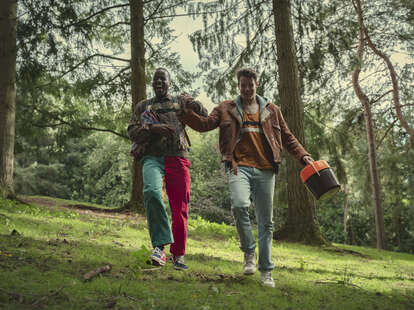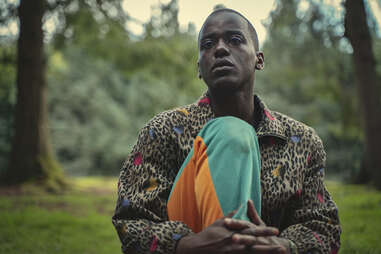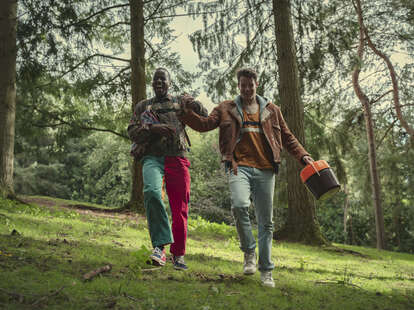

Netflix
Netflix’s Sex Education has shown that it can flawlessly blend the sweet and naughty bits with more difficult aspects of teenhood through the students at Moordale High, something that isn’t always so feasible in the real world. But now that we’ve spent two seasons getting to know the student body, we’re going deeper into them and exploring the people and situations that make up the lives of the characters we’ve come to adore.
Over the seasons I’ve become most attached to Eric (Ncuti Gatwa) and it has everything to do with wanting to be his dykey big cousin who gives him unsolicited advice on his love life—especially when it involves Adam (Connor Swindells), whom he is now officially dating. I’ll admit: I’ve despised their relationship since day one. Making a Black queer character fall in love (or lust) with their tormentor and oppressor was quite a choice. We make these sort of toxic decisions in our teen years (and often far after), but I watched this season in hopes that Eric would realize not just more of his worth, but realize the type of love he was worthy of receiving. I want the best for him, and while Season 3 gives us Eric in love, I wish he didn’t have such a difficult time getting there.
There is also this continuation of the attempt to make the viewers feel bad for Adam, to make us hope for his transformation from horrible bully to nice guy, but even after watching, I am still hard-pressed to root for him. I don’t enjoy that it’s mainly the characters of color (Ola, Eric, and Miss Sands) being used as a catalyst for Adam’s change, serving as his punching bags and therapists along the road to self-realization. It’s difficult for me to commiserate with a cis white male, even if he does spend nearly all 8 episodes trying to figure out who he really is.
Adam has been torturing Eric since middle school, physically and verbally, using all the ways of your typical bully—calling him names, pushing him in hallways, and even stealing his lunch. Then after 2 seasons filled with more cruelty, a confusing first sexual encounter, and forced declarations of queerness and love, they start this season in a relationship. Adam puts Eric through emotional olympics from Episode 1 where he attacks someone he thinks is laughing at him because of his new relationship. Then he hurts Eric by introducing him as his “friend” while in front of his mother, gets jealous of Rahim, who Eric left for Adam, and, because of it, picks a fight with Eric, and then wants to hide their relationship from the big gay world by using the age-old excuse of “liking it when it’s just you and me.”
Coming out and reckoning with all that comes with it, especially for someone like Adam who has spent his life learning and affirming all that comes with toxic masculinity, is difficult, I’m sure. But that doesn’t give him, or anyone, a hall pass to constantly hurt someone you claim to love, project your insecurities onto your new partner, and expect them to chalk it up to your queer growing pains.


For me, the major downfall of the season is that it spends too much time trying to humanize the wrong people and causing distress to those who didn’t deserve it. The high point of the season (and the best episode of them all) comes in Episode 6. Eric excitedly goes to a family wedding in Nigeria, where both the law and random citizens can do vicious harm if it’s discovered that you’re gay. Because of this, he has to hide this part of himself, downplaying his style and personality at the request of his mother for the sake of his safety and to keep his traditional grandmother happy. When the family wedding photos are being taken, Eric realizes this isn’t something that he’ll be able to have—he won’t be able to come to Nigeria and have his love celebrated by this part of his family and that hurts. Soon after at the reception, things take a surprise turn and Eric finds queer community in what he thought was a hopeless place. Community is key to our survival as Black queer folks, to be surrounded by people who look like you, understand your world, and that you can connect with despite them never having met you before? There is nothing like it. It’s special and rare, and I cherished the beautiful way the show chose to acknowledge that.
Autonomy shows up in a number of ways, it’s taken away a few times, and it also seems like everyone is in search of it—but aren’t we all when we are teens? First, we see the demolition of the abandoned toilets that played such a key role in the earlier seasons, a pseudo-safe space for students (and, this season, a teacher) to be themselves, if only for a few moments. Then uniforms are enforced on the students as part of an initiative to, well, make Moordale great again, a mandate from the new headteacher, Hope (Jemima Kirke), enacting rigid rules and sudden changes at the school. Both affect Cal, a non-binary student, played by musician and activist Dua Saleh, who we met (more intimately) when they were using the abandoned toilets as their personal changing room. They go on to build a sweet friendship with my favorite character, Jackson (Kedar Williams-Stirling)—who is sweet to his detriment—and fight with the rest of the students against Hope’s jarring autocracy.
The students start to slowly revolt and it culminates with them taking over an important assembly after they realize that she never had an interest in bettering their beloved Moordale, but instead wanted to change everything about it. She spent the season cavalierly misgendering some students, reducing Black pupils down to diversity pawns, and humiliating or sex-shaming whoever was left. After she officially loses her power as Headteacher, she doubles down and belittles the entire generation—from their political views to how they carry themselves—and deduces that she knew how to focus on the things that were actually important. I actually love the character of Hope, not because I in any way resonate or agree with her, but because she’s a perfect example of how damaging seemingly liberal white feminism can truly be. Putting youthful white women in positions of power isn’t always the greatest idea, no matter how welcoming their smile or incredible their choices in bold pant(suit)s are—their true colors come out when backed against a wall.
This season of Sex Education is more mature. Its younger characters are growing up and the older ones are acknowledging and releasing issues that have been preventing them from doing the same. The season has its familiar playful and raucous sex scenes (it starts with a bang) but there’s quiet and intimate moments sprinkled in, visually blending the sexual elements with the educational. We see Layla (Robyn Holdaway), another enby character painfully binding their chest, watch Hope struggle through IVF treatments, and see the effects of generational trauma with nearly every teen character, but especially Maeve, Adam, and Nick. The Moordale crew is growing up, and I’m hoping there is more healing, love, and sex in their future.








